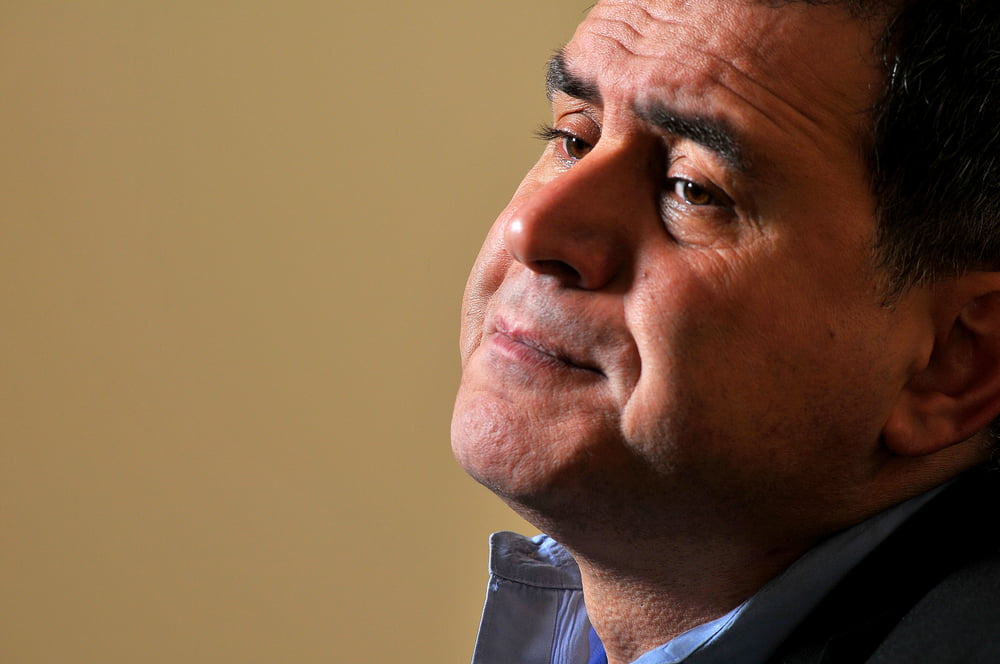In case you were wondering, Nouriel Roubini’s stance on Bitcoin and other cryptos hasn’t changed a bit. He still thinks cryptos are a scam, and believes Bitcoin is “bulls**t”. In a panel discussion at the Milken Institute in Los Angeles, the economist who lectures at New York University referred to late Bitcoin entrants as “suckers” who would end up being preyed on by the earlier entrants.
The panel consisted of Abra’s CEO and founder, Bill Barhydt, Alex Mashinsky, CEO of crypto lending pool Celcius Network, and Brent McIntosh, general counsel for the U.S. Treasury. It was moderated by Anna Irrera, a journalist from Reuters who had to step in time and again as the debate got heated.
The Mother Of All Bubbles?
Without wasting any time, Roubini started tearing into Bitcoin in his opening statement. In the last year, everyone rushed to Bitcoin to take advantage of its fast rise to $20,000, and once people realized that it was “the mother of all bubbles, the biggest bubble in human history”, its price steadily fell to its current level, Roubini begun. Those who arrived late to the party were the “suckers” who bought from the early investors who made millions from them, as is typical of any bubble.
Bitcoin isn’t a currency, he continued, as it doesn’t fulfill the three primary roles of a currency – a unit of account, a means of payment, and a stable store of value. Quoting Ethereum’s founder Vitalik Buterin, he said that cryptos were faced with a dilemma between providing scalability, security and decentralization.
And the reality is, all this talk about decentralization is just bulls**t. It’s bulls**t because all the solutions that have been found so far to the problem of scalability, going from five transactions per second, means that Bitcoin is never going to be used as a means of payment, implying massive concentration risk and centralization and therefore no security.
He went on to further blast the rising centralization of mining activities in the Bitcoin and Ethereum ecosystems, claiming that the top three Bitcoin miners control over 55% of the mining activity, with Ethereum faring even worse as 61% of the mining activity is controlled by the top three miners.
The entire industry is becoming a massive concentration, and the concentration is increasing. The oligopoly power of the miners is becoming bigger for technical and technological reasons. There’s no decentralization. It’s just bulls**t.
The ‘pro-crypto’ members of the panel were quick to counter Roubini’s assertions, with Mashinsky explaining how decentralization is changing the world, giving the example of his own experience as a pioneer in Voice Over IP (VoIP) development in the 90s. The crypto and blockchain revolution is the next phase, with Money Over IP (MoIP) technology bringing down the cost of transferring value to zero. Abra CEO Bill Barhydt also stated that having worked in various capacities including as a cryptographer for the CIA, he views cryptos as solving problems that couldn’t possibly be solved in any other way. These include global decentralized investing, global funds transfers – which, using smart contracts and second layer technology, can now scale to Visa’s numbers – consumer asset finance, and more.
You Won’t Even Know You Are Using It
Barhydt had an interesting analogy in which he likened decentralized technology and cryptos to the TCP/IP protocol.
When you use Netflix, you make a TCP/IP connection to a server. I’m willing to bet that none of you [have] any idea what that means. And that’s good. If you had to know what that means to use Netflix, you wouldn’t use Netflix. Bitcoin will work in the same way. You’ll be using blockchain tech and cryptos to make payments, move money and use credits, and you won’t even know it.
As the panel shared its thoughts on the future of money, the vulnerabilities that cryptos face, the role of the government in the crypto ecosystem, and the centralization of the mining process, the debate got heated as Roubini accused Barhydt and Mashinsky of making stuff up, to which Mashinsky had a swift response.
You don’t even own any crypto. How can you talk about it? Why don’t you buy one coin and then you can tell us how it works.
While many will be quick to dismiss Roubini as biased against Bitcoin and blockchains – he does have a history, after all – some of the issues he raised are pertinent to the future prosperity of the crypto industry. The earlier they are addressed, the better it will be for this industry.

